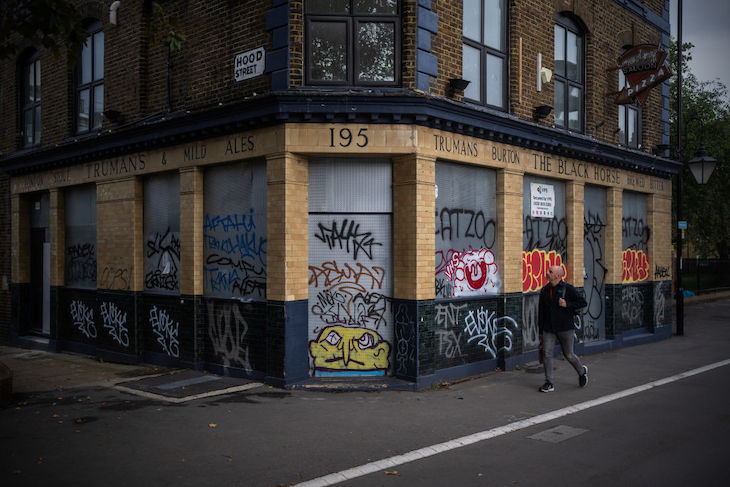It was a drizzly Tuesday evening in the 17th-century Oxford village pub I manage, the kind of night when regulars huddle close to the bar, pints glowing amber under low lights. An old chap in a flat cap, nursing his third ale, grumbled about the council’s latest parking scheme. The village curate, leaning on the bar, sparred with the local councillor over the steep cost of saving the church roof. A young couple, new to the area, weighed London against Oxford, sneaking glances at the football on the telly.
For a moment, the pub hummed with life – a microcosm of England, where strangers turn mates and the day’s weight lifts in shared chatter. At their best, pubs are living rooms for the nation. They stand shoulder to shoulder with churches, their closest neighbours – the pub’s warm glow mirrored by the stained glass across the lane, twin guardians of village life.
The best pubs reflect England as it is: richer, more varied, more alive than the cliché suggests
This is the ‘crowded life’ Eric Hoffer spoke of – a life of connection, purpose, and shared struggle that binds us to something larger. Hoffer, a dockworker-turned-philosopher, saw it as an antidote to loneliness, found in work, faith, or fellowship. In England, for centuries, it’s meant the pub – a sanctuary of community. But that sanctuary is fading, its doors closing alongside those of churches, leaving villages quieter, colder.
The English pub isn’t just a watering hole. It’s a town hall, a counselling room, a stage, a shelter. In medieval times, alehouses were where pilgrims swapped tales en route to Canterbury. By the 17th century, they became stages for travelling players, performing Shakespeare for a penny a head. In the 18th century, coastal pubs hid smugglers’ brandy in cellars, the landlord pouring ale for excisemen none the wiser. Victorian pubs hosted union meetings, workers’ courage fortified by bitter in the flickering gaslight. In 1945, village pubs burst with VE Day joy, bunting strung across beams as soldiers toasted their victory. From Chartist meetings to darts nights, the pub has anchored English life – its story told in clinking glasses and the hum of voices.
Walk into any proper pub, and England’s soul is laid bare. The publican, wiping down the bar, faces rising costs with the stoicism of a wartime grocer. Overheads push up the price of a pint, once a cheap laugh, now a sting in the wallet, as regulars nurse their drinks and camaraderie erodes. Postmen, teachers, cabbies trade tales of tight budgets and NHS queues, their gallows humour a shield against despair.
It’s not just a rural problem. In London, old boozers become boutique flats or wine bars for hedge funders. In North Shields, a mate who weathered decades behind the bar lost his pub to a rent hike from a Dubai-based property fund. The enemies shift – greedy landlords, distant investors – but the result is the same: another boarded-up local, another piece of England gone.
Running a pub takes grit. It’s the England of small, stubborn acts of defiance against a world that prizes efficiency over heart. Quiet yet unyielding as oak, these pubs embody the essence of English resistance. Smoking bans, recessions, home drinking, unfair rates – the challenges stack up. Covid lockdowns deepened the wound, shuttering pubs for months, pushing punters to supermarket cans and Zoom quizzes. Many never returned. Yet my pub endures, its oak beams blackened by centuries, sagging ceilings and rattling windows bearing witness to generations past – a living memory I fear we’ll lose, window by dark window.
Hoffer warned that, without a crowded life, people turn to fanaticism or despair. We see both in England today. Sectarian campaigning in Wycombe’s local election this year reveals a nation fracturing into tribes, no longer bound by shared spaces like the local pub or church. Boarded-up pubs in Manchester or Malton whisper a quieter defeat, as communities lose their places of gathering and grace.
The media often mourns the ‘great British pub’ in sepia tones – oak beams, warm bitter – but that misses today’s reality. Irish pubs welcome migrants, Desi pubs in Birmingham blast bhangra after a cricket match. The best pubs reflect England as it is: richer, more varied, more alive than the cliché suggests.
What’s to be done? The Spectator has called for a pub’s tsar to fight their corner. But beyond a figurehead, we need policy: rate reform, tax support, grants for community-owned pubs, and planning protections to stop developers from tearing down places that matter – a fight for pubs and churches, twin anchors of village life.
This isn’t just nostalgia. Pubs are where England argues, laughs and mourns. During lockdown, virtual bar podcasts were a pale substitute for the packed pub – someone yelling at the football, another crying into their Guinness. That same week, the young couple returned with their parents and struck up a conversation with the old boy in the cap – a retired classics professor. Four strangers, two generations, united by pork scratchings and pints. That’s the crowded life. That’s what we’re losing.
Pubs fight the twin scourges of our age – loneliness and isolation – as a widower finds solace in the barman’s quiet nod, a small gesture that says he’s not alone, and a young mum chats with strangers, her baby napping nearby. Their laughter, fleeting but vital, is a lifeline in a world that feels disconnected – a reminder of why pubs endure as England’s beating heart, a bulwark against the cold of solitude.
As I locked up that Tuesday, rain lashing the muddy lane outside the pub, the wind howling through the empty village, I thought of Hoffer’s call for connection. England’s pubs and churches offer a better kind of crowded life – one where freedom means belonging, not escape. If we let them die, we lose more than buildings; we lose England’s soul, one dark window at a time. The question is whether we’ll fight to keep them – or watch that soul fade away.







Comments